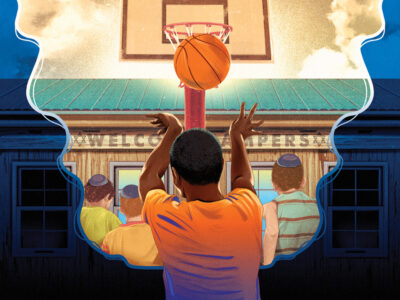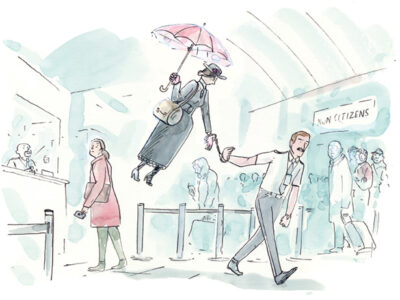
The snacks may change, but baseball is baseball.
By Craig Simons
Between the time this essay was written and when it was scheduled for publication, severe acute respiratory syndrome (SARS) emerged from China to capture headlines worldwide. Concerns about SARS prompted the government of Chengdu, the capital of China’s central Sichuan province, to cancel all major public gatherings. As a result, this alumnus might not get a chance this year to go to the ballpark for peanuts and, well, bubble tea. In this case, though, there’s always last year.
Nobody sings, “Take me out to the ball game” and the refreshment stand doesn’t sell hotdogs or Crackerjacks, but when He Wei hits a short looper up the middle and Wei Sicong slides into third, I feel a little closer to home.
I cheer as Mei Erkang steps to the plate and singles into left field, a weakly lofted shot that cruises just over the outstretched glove of shortstop Shi Mingzhi, and when Shi throws the ball to Meng Donghai and Meng drops it I feel a twinge of excitement as Mei charges towards second: There is bound to be a collision. But Meng fails to scoop up the fallen ball, which lies limply in the grass just beyond the infield, and Mei slides to safety in a huge cloud of unnecessary dust. A kid sitting next to me leans over and asks—with, I think, a twinge of shame—if American baseball is better than Chinese baseball.
“It’s pretty much the same,” I lie. But I’m just happy to be at a game, to see a field and watch a pitcher stare down a batter, even if they are all only 14 years old.
“What can we get for snacks here,” I ask the kid, who turns out to be named Ke Xianglong.
“Noodles,” he says. “Or do you want some bubble tea?” He shows me a plastic cup filled with brown beans soaking in a caustic-looking orange liquid.
So the snacks aren’t very good either—there are no hamburgers, hot dogs, or candy, and the best I can do is a bag of Elder and Younger Brother potato chips. But I have been in China for a long time and ping-pong is not my idea of a spectator sport.
I first came to China in 1996, just after I graduated from Penn. Then I was a Peace Corps volunteer teaching English at a small teachers college in Sichuan province. Baseball wasn’t an option.
A few jobs, a couple of countries, and a master’s degree later, I ended up back in Sichuan, this time in the capital city. When a friend of a friend, a woman named Meng Qingli, asked me if I wanted to go to the Sichuan provincial middle-school baseball championship game with her, I said, “Of course I do. I’m American.”
Meng played for China’s national softball team—perennial world-championship contenders—until she threw her back out in the early 1990s, and she told me that while Chinese women players are top-notch, the men lag behind.
“Most Chinese boys aspire to be good at ping-pong or badminton or basketball or soccer. Baseball hasn’t really caught on yet,” Meng explained as the center fielder tripped while racing to catch a pop fly. “It will probably take a long time.”
Chinese have played America’s “national pastime” for more than a century, first in Beijing and Shanghai—where foreigners brought the game—and later across the country, particularly as Japanese soldiers pushed west during World War II. “The Japanese liked to play sports, especially baseball,” Meng said. “Sometimes Chinese would play with them.”
But Mao Zedong’s Cultural Revolution put an end to baseball—as it did to most games that didn’t involve chastising intellectuals and holding entrepreneurs up to ridicule and abuse. Things didn’t really pick back up until the late 1970s, after Mao died and Deng Xiaoping, who had a penchant for sports, especially soccer, took over.
Today there are more than 60 baseball training schools across the country and there have been some success stories, notably the Seattle Mariners drafting a 16-year-old pitcher named Wang Chao, the nation’s first player to sign with a Major League club. But China still lacks qualified coaches and players. “Look,” Meng huffs as Shi, the shortstop, fumbles a groundball most American Little Leaguers would turn into a double-play, “the fielding isn’t very good.”
Neither is the hitting. Only a few balls make it out of the infield and plenty of players strike out. But I don’t care. For me the field, wedged into the center of Chengdu, a city of nearly 10 million people in the middle of the country, is as close as I’ll come to home.
When a chubby player from the southern Sichuan city of Panzhihua comes up to bat and hits a long fly ball that arcs over the glove of a Chengdu team player violently backpedaling, I jump to my feet and knock over my cup of bubble tea.
Craig Simons C’96 has written for many U.S. and Asian newspapers. He wrote for the Gazette about his life in China in the March/April 1999 issue.




